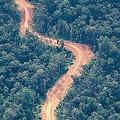 巴布亞紐幾內亞大學遙測中心在一份新的報告中,透過衛星影像揭櫫,巴國政府為了保育境內世界第三大熱帶森林的碳捕集能力,積極遊走各方尋求援助。不過在同一時間,政府卻默許伐木工於可及之林地砍伐開發,破壞森林的情形在2021年之前,不是嚴重惡化就是幾乎全遭整平。
巴布亞紐幾內亞大學遙測中心在一份新的報告中,透過衛星影像揭櫫,巴國政府為了保育境內世界第三大熱帶森林的碳捕集能力,積極遊走各方尋求援助。不過在同一時間,政府卻默許伐木工於可及之林地砍伐開發,破壞森林的情形在2021年之前,不是嚴重惡化就是幾乎全遭整平。
遙測中心的科學家們發現,國土中保育區域與非保護區的界線不明,兩地森林遭破壞的速度幾乎相當。他們估算,巴布亞紐幾內亞內可及的林地,在2001年的一年之內,森林消退或被砍伐362,000公頃。依此速度下去,境內83%的可及森林於2021年以前,將嚴重遭到破壞或消失。
從衛星影像觀之,伐木公司、農業發展及森林大火正逐步吞噬巴國的森林。遙測中心主任兼報告的主筆雪爾曼(Phil Shearman)認為,「政府官員或許寄望富國可以金援他們保育森林,不過在另一方面又允許多國木材公司四處砍伐,最後當然只剩那些人類難以到達、不便剝削的處女地,這樣的兩手策略根本無助於巴國的森林保育」。
該報告歸論出,根據森林消退的資料,巴方確實有其必要縮減當前伐木產業的活動範圍,以及放棄更大型的新開發案;同時也呼籲政府和多國的合作開發夥伴,一同協商出森林保育與林木貿易活動之間的平衡、尊重當地部落合法擁有森林的權力,並且讓那些部族成員可依其發展需要,善用與保護他們的森林。
雪爾曼指出,「不幸的是這樣的理想與現實仍有相當大的差距,多國木材公司反覆且浪費地剝削巴布亞紐幾內亞的森林,絲毫不顧其可能帶來的環境衝擊與後果,巴國官方機構甚至在當中扮演被動的共謀者」。
澳洲國立大學艾許(Julian Ash)博士指出,該報告藉由訂立明確的目標,提供巴國機會規劃實質且經得起考驗的計劃,以落實保育工作、永續林產與加入碳交易市場的運作。
雪爾曼表示,未來任何新的林業計劃均應含括中小型、當地管理與經營的執行策劃中心,如此一來商業行為方能以環境永續的原則來活動,而當中的獲利也將可注入森林部落之中。
該份報告執筆者們相信,只要願意付出,永遠不嫌晚。雪爾曼認為,由於巴布亞紐幾內亞已喪失森林的覆蓋保護,在全球氣候變遷的衝擊下顯得格外赤裸,為了確保自身利益,政府勢必將置身全球夥伴行列,為環境奮力。
At the same time that the government of Papua New Guinea is seeking compensation for conserving the carbon-trapping capacity of its the world's third largest expanse of tropical forests, destruction of these forests is occurring so fast that by 2021 most of the areas accessible to loggers will have been cleared or degraded, a new report based on satellite images reveals.
Scientists at the University of Papua New Guinea Remote Sensing Centre discovered that even in so-called conservation "protected areas" forest destruction is occurring at the same pace as in unprotected regions. The scientists estimate that in 2001, Papua New Guinea's accessible forests were being cleared or degraded at a rate of 362,000 hectares a year. At that pace, by 2021, 83 percent of the country's accessible forest will be gone or severely damaged.
The forests are under pressure from industrial logging, agricultural expansion and forest fires, the satellite images show. "Government officials may claim that they wish rich countries to pay them for conserving their forests, but if they are allowing multinational timber companies to take everything that's accessible, all that will be left will be lands that are physically inaccessible to exploitation and would never have been logged anyway" said Phil Shearman, the report's lead author and Director of the UPNG Remote Sensing Centre.
The report concludes that the data on forest destruction justifies curtailing current logging industry activities and scrapping new large-scale projects. It also calls for the government and international development partners to reorient conservation and commercial forestry activities so that they respect the rights of local communities that legally own the forest, and enable members of those communities to better use and conserve the forest for their own development needs. "The unfortunate reality is that forests in Papua New Guinea are being logged repeatedly and wastefully with little regard for the environmental consequences and with at least the passive complicity of government authorities," Shearman said.
Dr. Julian Ash from the Australian National University said that "by providing an objective, the study can offer an opportunity to institute genuine and verifiable programs that will lead to real conservation, sustainable forestry and meaningful participation in carbon trading markets."
In order to avoid further damage, Shearman says that any new forestry programs should involve small and medium-scale, locally-owned and managed operations where commercial activities are more likely to be environmentally sustainable and the benefits are more likely to flow to forest communities.
The authors believe that it is not too late to act. Shearman said the government could make a significant contribution to global efforts to combat climate change. It is in its own interest to do so, as this nation is particularly susceptible to negative effects due to loss of the forest cover.
全文及圖片詳見 ENS







